The Roads to Freedom : Jean-Paul Sartre
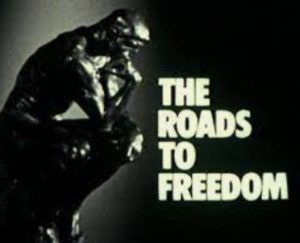
https://www.youtube.com/watch?v=kFnY-TP8468
The Roads to Freedom (French: Les chemins de la liberté) is a series of novels by French author Jean-Paul Sartre. Intended as a tetralogy, it was left incomplete, with only three of the planned four volumes published.
The three published novels revolve around Mathieu, a Socialist teacher of philosophy, and a group of his friends. The trilogy includes: L’âge de raison (1945) (The Age of Reason), Le sursis (1945) (which is generally translated as The Reprieve but could cover a number of semantic fields from ‘deferment’ to ‘amnesty’), and La mort dans l’âme (1949) (Troubled Sleep, originally translated by Gerard Hopkins as Iron in the Soul, Hamish Hamilton, 1950). The trilogy was to be followed by a fourth novel, La dernière chance (i.e. The Last Chance); however, Sartre would never finish it: two chapters were published in 1949 in Sartre’s magazine Les Temps modernes under the title Drôle d’amitié. The last part of The Last Chance was later reconstructed and published in 1981.
I first read the Roads to Freedom as a student in the 70s and even wrote about it. But, I have forgotten a lot about it since then.
As students, it was fashionable to dismiss Sartre as a ‘has been’; existentialism was a kind of ‘limp humanism’. With its tenets of ‘existence preceding essence’, it seemed to typify an attitude and mood that very much reflected its times – of war! – where decisions made could indeed result in life or death. Not something to take into a ‘peacetime’ world at all…….
I have recently watched the TV version, first broadcast in 1970 – an age where the BBC felt confident enough to produce contemporary drama of a challenging kind. It features many well known actors and actresses of the period – many now deceased.
Most of the characters seemed to reek of the same sort of world detachment that we find in Flaubert, and then in more modern times in Camus and Sartre: Nausea and The Outsider. Mathieu (Delarue – a joke!?) could almost be the hero in each.
Existence might precede essence in his and other cases, but that existence seems saturated with social conditions – it then becomes almost a sociology – not something that would have interested Sartre per se.
Many issues ‘of the day’, of course, dealt with: sex, feminism, homosexuality, communism, etc.
But, the characters all seem to be play-acting according to some inner narrative of who they are – outside of their actual environment. Again, a kind of social conditioning at odds with their surroundings.
The experience of detachment of Mathieu, and his inner dialogue reflecting his alienation from his life and times, shows someone who can find no sense/ meaning/ justification in surroundings: feelings are transient, sense of self is fragmentary, contemporary affairs meaningless. His girlfriend gets pregnant and he sets out to do ‘the right thing’. But, his actions are thwarted by others. Yet, he still seems half-I, half-out: both sort of caring and not caring. His decisions do have consequences of a kind but seem to set up another kind of dilemma. And, he is distracted all of the time. So, where is the freedom?
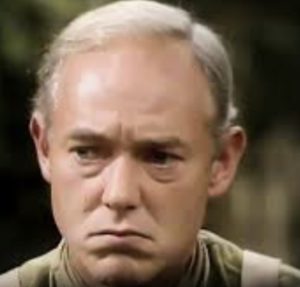
Michael Bryant as Mathieu
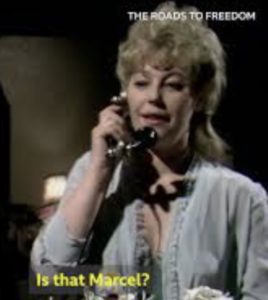
Rosemary Leach as his girlfriend Marcelle
Daniel’s self-dialogue also shows someone who can objectify himself – but then with respect to a moral position he transgresses. So, in effect, society is in him but he is both in and out of it.
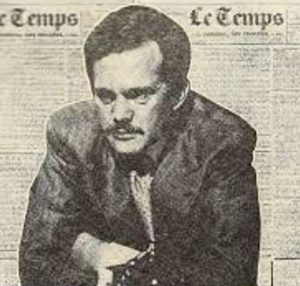
Ivitch presents herself as a kind of muse but not from any moral, philosophical or even personal base.
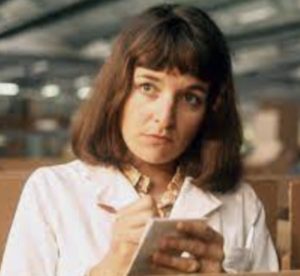
Alison Fiske as Ivitch
Brunet appears to be there to draw attention to the fantasy of political commitment (even though Sartre was a member of the Communist party).
Only Lola is ‘real’: she knows who she is and what she wants.
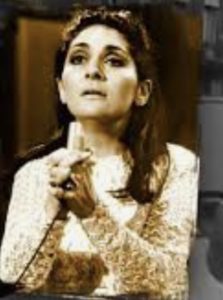
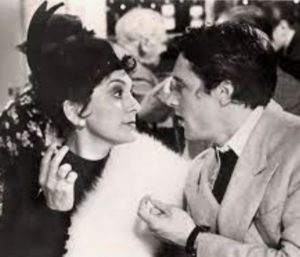
Georgia Brown as Lola (Also sings the title song above)
Yet, the whole series struck me as having contemporary relevance, and made me sense a need to reassess Sartre.
Certainly, in todays world, there are people who continue to ‘play’ even as calamity gathers. I thought of the way life continued as normal in the Ukraine – cafes open, people going about their daily lives, etc. – right up to the Russian offensive. Almost as if it was as unreal as anything else – until it was very real. Climate change of course. I also thought of Auden’s Musée des beaux arts. That life goes on even in the face of the worst human atrocities.
Musee des Beaux Arts
- H. Auden
About suffering they were never wrong,
The old Masters: how well they understood
Its human position: how it takes place
While someone else is eating or opening a window or just walking dully along;
How, when the aged are reverently, passionately waiting
For the miraculous birth, there always must be
Children who did not specially want it to happen, skating
On a pond at the edge of the wood:
They never forgot
That even the dreadful martyrdom must run its course
Anyhow in a corner, some untidy spot
Where the dogs go on with their doggy life and the torturer’s horse
Scratches its innocent behind on a tree.
In Breughel’s Icarus, for instance: how everything turns away
Quite leisurely from the disaster; the ploughman may
Have heard the splash, the forsaken cry,
But for him it was not an important failure; the sun shone
As it had to on the white legs disappearing into the green
Water, and the expensive delicate ship that must have seen
Something amazing, a boy falling out of the sky,
Had somewhere to get to and sailed calmly on.
The absurdity of the politics is drawn out with the Munich events, defeat, impending collaboration.
And, one thing one can say – à la existentialism – is that the characters instantly experience the consequences of their most present actions – almost like an ‘instant karma’ – even if that is more of the same.
How to break out of the cycle?
Various alternatives are explored – most left incomplete as the story advances and the characters fade away.
Only Mathieu’s predicament is brought to final resolution. But, here we have a delirium of violence as he sets about killing soldiers ‘in the name of’ all the narratives he has fought against. This response made me think of sexual excesses of people like Bataille, Artaud and Foucault – that somehow returning to a kind of bestiality is freedom because it transcends the social. But, even that is not really true.
Human consciousness depends on an acknowledgement of the relationship between the subject and the object – or nature and culture – or sign and signifier. You can never escape by throwing your lot into one as a way of destroying in convenience of the other. Therein lies transcendence – Nazism. Rather, it is about exploring the nature and limits to thought and action of the relationship between the subject and object. Something that Pierre Bourdieu spent his life doing.
Sartre’s conclusion seems to be that men must fight and kill each other. Mathieu finds ‘freedom’ in this but it is an odd sort of freedom – a destruction – not a freedom at all, really. Existence then might precede essence but it is an existence with no moral value. Hence, I guess, ‘men are condemned to be free’ – the ‘absurd’. In this case, Sartre’s position is not a million miles away from post-modernism.
At a personal level the alternative would seem to amount to the kind of ‘art for living in a time of catastrophe’ that Beckett wrote of. More socially based, the alternative would be an ethos around which men and women can group. Language might be involved here but can never express such an ethos. Rather it is about a sense of the invisible space that links the sign and the signifier and all associated dualities. In this case, ‘the particular’ becomes part of ‘the whole’: Intelligence.